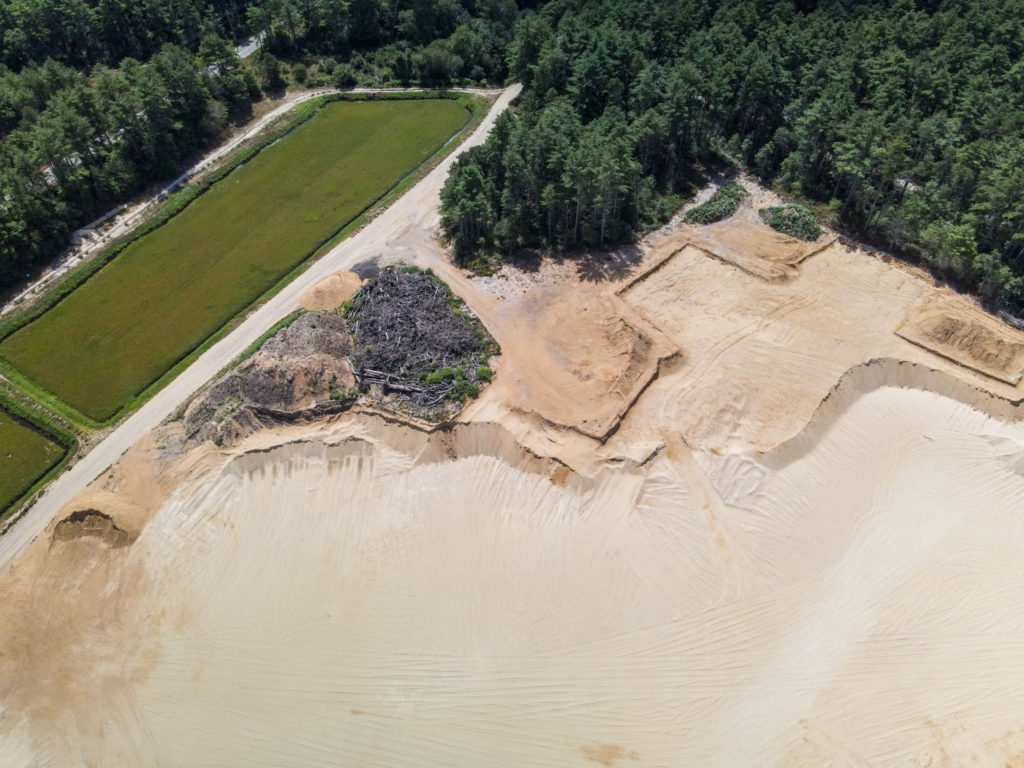Sign Our Petition for a Moratorium on Sand and Gravel Mining!
According to public records, Southeastern Massachusetts has lost over 61 million cubic yards of sand to sand and gravel mining industries. Industrial Sand and gravel mining is having a devastating environmental impact in our area, causing habitat destruction, soil erosion, and air and water pollution. We must act now to preserve our land so that our water is not compromised in future.
Read more in our new report, Sand Wars in Cranberry Country: An investigation into the money, politics and corruption behind sand mining and its silent environmental crisis in Southeastern Massachusetts
Take Action!
- View Our Calendar for upcoming public hearings on new sand and gravel mining permits
- Write to your local Planning Board or Select Board about the dangers of sand and gravel mining
- Attend one of our Standouts!
- Watch our webinar, Community Planning for Conservation
- Sign our Petition
- Contact Community Land and Water Coalition about a sand and gravel mining site in your Town
Why Sand and Gravel Mining is Harmful
Threatens Water Quality
Sand plays a crucial role in filtering and purifying water. As the water moves through the sand, it is filtered by the sand particles, which remove impurities, such as sediment, organic matter, and suspended particles. Sand works to naturally clean and filter water before it enters an aquifer, helping to maintain the quality and quantity of the groundwater resources that we rely on for drinking water. Read more in this testimony by expert hydrologist, Scott Horsley:
Destroys Forests, Wetlands and Wildlife Habitat
Mining activities destroy and alter the natural habitat of wildlife and plant species, especially as the forested land above the sand is stripped of native trees and vegetation. Extraction of sand and gravel leads to the destruction of wetlands, rivers, streams, and other aquatic habitats. Sand and gravel mining can also cause soil erosion, which can lead to the loss of valuable topsoil and other nutrients essential for plant growth.
Emits Harmful Silica Dust
Mining activities can also lead to silica dust emissions, which have negative impacts on air quality and respiratory health. Many residents in neighborhoods impacted by nearby mining activities in the area find their homes, cars, and property covered in hazardous silica dust. According to the Occupational Safety and Health Administration (OSHA), silica dust can lead to lung disease, kidney disease, chronic pulmonary disease and cancer if inhaled into the lungs.

Lucrative, Globally Rare Commodity
According to the United Nations Environmental Program (UNEP), sand is the second most mined resource on earth, second only behind water. Sand is a valuable natural resource that we must manage and conserve if we are going to have enough for future generations. According to the UNEP, we must switch to improved practices for resource extraction, especially where it has the potential to cause erosion, harm rivers and streams, and water supply.
No Enforcement of Local Laws
Aggregate mining companies such as A.D. Makepeace, E.J. Pontiff, Alex Johnson Cranberry and others take advantage of right-to-farm laws and the history of farming in our communities. They apply for weak agricultural permits that allow them to extract hundreds of thousands of cubic yards of sand underneath our feet and sell it for millions of dollars to construction companies.
Read more on our Blog:
